
The Internet's Premier Classical Music Source
Related Links
-
Introduction
Acoustics
Ballet
Biographies
Chamber Music
Composers & Composition
Conducting
Criticism & Commentary
Discographies & CD Guides
Fiction
History
Humor
Illustrations & Photos
Instrumental
Lieder
Music Appreciation
Music Education
Music Industry
Music and the Mind
Opera
Orchestration
Reference Works
Scores
Thematic Indices
Theory & Analysis
Vocal Technique
Search Amazon
Recommended Links
Site News
 Book Review
Book Review
John Shepherd - Missa Cantate
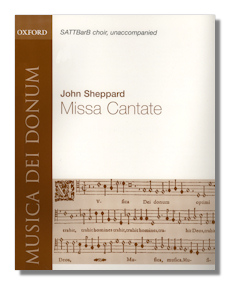
Sally Dunkley & Francis Steele (Series Editors)
Musica Dei Donum
Oxford University Press
ISBN: 0193870045
ISBN-13: 978-0-19-387-004-8
Musical scores (what the entertainment industry calls "sheet music") are a cheap and accessible way to enhance the listening experience, of course. Such publications are better if prepared by experts with knowledgeable specialists in mind. Better still if they include background texts, translations and are easy to read and use. And irresistible if well produced and attractively priced. A new series of early music scores from Oxford University Press, Musica Dei Donum, meets all these criteria – and others, making them a very welcome addition to early music lovers' bookshelves.
Half a dozen substantial scores are so far available in the series: music by Byrd, Philippe de Monte, Cipriano de Rore, Lassus, Mundy, John Sheppard and Robert White. Each of the 9" x 12" paperbacks is cleanly printed in monochrome and with a sober and nicely designed chocolate on white cover, which also indicates prominently which forces (SATB/Bar/Choir etc) will be needed. They vary in length from 12 to 64 pages, the bulk of which are the scores themselves set in modern notation but with indications of contemporary key and time signatures. In the background text are editorial annotations… textual uncertainties, and (resolved) ambiguities; how bars/measures have been arrived at; accidentals; changes from expected mensuration and placings etc.
Although each score contains clean and idiomatic line by line translations specially commissioned by by Jeremy White from the Latin (in most cases so far in the series), the scores themselves also reproduce the phrases in the original and in English as they occur over the staff. This only adds to the usability of each publication in the series. Not pocket size, the scores are both light enough in weight yet large enough in size to function amply as performance editions. And as series editors Sally Dunkley (a founding member of The Sixteen and singer with the Clerkes of Oxenford, now also an established specialist in 16th-Century vocal music) and Francis Steele (also a student of David Wulstan; now an independent performer and coach) say, "Whilst the reduction can be played on a keyboard, our priority has been to preserve the integrity of the vocal lines rather than to present an idiomatically pianistic score." In this they have succeeded admirably. The qualities of authority and authenticity, accuracy and hence usefulness of the scores themselves are as high as can be.
In addition to the score itself, each publication contains brief contextualization. Paul McCreesh, for example, writes about the richness achieved by Sheppard in his Missa Cantate. The editors then present a brief and apposite introduction to the composer, the type of music composed and something of their reception and take up by modern scholars and performers. This includes a short annotated set of modern references (articles, books, primary sources, and the particular source(s) used in each case, discography etc). Together with the aforementioned translation and notes comes a substantial yet pithy performance guide. That these are written by performers obviously very familiar with the music adds to their value. Decisions – on the use (or not) of "expression marks"; on how to arrange the performers; on tempi etc – are explained; and suggestions offered on aspects still left open to doubt or disagreement. The arrangement of this textual support for the full performing score differs from publication to publication, indicating that this series is in no way a formulaic effort. But a vibrant, organic one that unambiguously reflects the commitment to and love of the music by all involved. It's to be hoped that these aspects of the enterprise will lead to the music's greater take up by choirs and listeners. One of the aims of Musica Dei Donum is to introduce lesser known works from the medieval and Renaissance periods.
At prices ranging from between under US$4 to US$17 and available for purchase direct from Oxford University Press, the quality and immediacy, the additional information as well as the authority of these scores all make them highly recommendable. This is a series to watch and for lovers of early vocal music to collect as they appear.
Copyright © 2009, Mark Sealey.
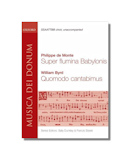 Philippe de Monte: Super Flumina Babylonis & Quomodo Cantabimus, Vocal score ISBN10: 0193868172 ISBN13: 9780193868175 |
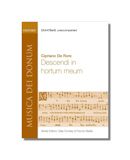 Cipriano De Rore: Descendi in hortum meum, Vocal score William Byrd: Quomodo Cantabimus, Vocal score ISBN10: 0193804921 ISBN13: 9780193804920 |
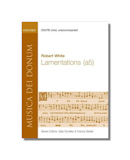 Robert White: Lamentations (A5) ISBN10: 0193804913 ISBN13: 9780193804913 |
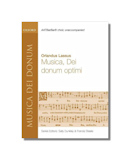 Orlando Lassus: Musica, Dei donum optimi, Vocal score ISBN10: 0193868164 ISBN13: 9780193868168 |
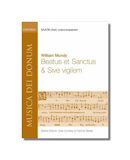 William Mundy: Beatus et Sanctus & Sive vigilem, Vocal score ISBN10: 0193870053 ISBN13: 9780193870055 |


















